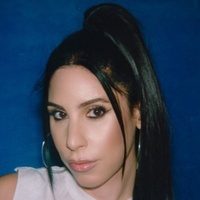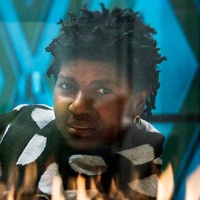As told to Shy Watson, 2250 words.
Tags: Writing, Money, Process, Identity, Politics, Day jobs.
On finding a way
Writer Matthew Binder discusses entertaining yourself, quitting jobs, speaking honestly, and capturing a moment.The contemporary art commentary in your novel reminded me a lot of Ottessa Moshfegh’s My Year of Rest and Relaxation. Do you have personal experience in the gallery world? How do you hope to characterize it?
No, I don’t have any firsthand experience in the gallery world. I moved to New York in 2017 and started dating this woman who was high up in luxury fashion, and the fine art people were in her orbit. And so I made friends with them.
When I started writing about the art world, it may have appeared like I was satirizing it, but I wasn’t satirizing anything. I was writing about these characters in an honest way, but their lives were absurd, so the work comes out absurd.
Money seemed to be a big factor these artists had in common, especially Danny, with the Maserati and the Ferrari, and just being able to afford all these crazy retreats and vacations and culturally appropriative trainings and whatnot. Was that intentional or just a byproduct of observing these artistic elites?
When I moved to NYC, I witnessed a type of money I’d never seen before. For instance, my ex’s friend was dating the son of a billionaire hedge fund manager. When he went to the Hamptons, he would never think of driving, because he had a helicopter at his disposal.
In the book, Paul’s blind to both the benefits and horrors of Danny’s wealth. Paul’s more interested in his cousin, who he believes has achieved the pinnacle of success, because that’s the guy he compared himself to as a kid. But his cousin is just a manager at a hardware store. Strangely, the cousin is the only character Paul treats poorly, and thinks poorly of, even though all the other characters are doing awful things, while the cousin is actually the sweetest person he knows.
But a big part of the book is simply documenting the absurdity of wealth in a place like New York City, where there are some people who have more money than god, and what that means in terms of how they can get away with whatever the hell they want without consequences.
Where were you before New York?
Directly before New York, I lived in Budapest for a while. But before that, New Mexico and San Diego.
You must have felt like you were jumping into a bath of cold water.
My rent in Budapest was $260/month. I knew New York was expensive, but I didn’t really have a sense of proportion until I got here. So that was pretty brutal.
What you’re saying reminds me of that pawn shop where Paul got a really good deal on the gold chain and the liquor store with the loosies, and how they were replaced by the vegan cheese place and the florist that specialized in lesbian weddings. It felt like you were writing about a very Brooklyn specific form of gentrification there.
Yeah, absolutely. Paul looks at the world differently than everyone else. His rich artist friend, Danny, bought a warehouse and turned it into his studio. Danny was convinced it would be a tremendous investment. And in normal societal terms, it was. The neighborhood went from rundown to totally gentrified, a place where property values skyrocketed. But Paul’s eyes are blind to that. He thinks Danny had it all wrong, that they’ve lost everything of real value in the community. Where did the pawn shop go? he wonders. And he’s not being ironic, it’s just the way he sees the world.
He’s very earnest. Pure Cosmos Club kind of reads like a work of cultural criticism, whether or not it was intentional. It reminded me of Chuck Klosterman’s Sex, Drugs, and Cocoa Puffs, if you’ve ever read that.
Oh, yeah.
Have you ever considered writing non-fiction or cultural essays?
I published an essay once, and it got me in trouble, so now I write everything under a veil of fiction. Plausible deniability is the key to my success.
Can I ask what the essay was about?
I wrote about the monoculture of the New York City literary scene back in 2017. It was about how the scene only valued diversity with respect to skin color, sexuality, and identity. Diversity of thought, however, was not encouraged. Any ideas that conflicted with progressive orthodoxies weren’t allowed.
I think when Trump first took office in 2016, it was basically all hands on deck, like you had to be fighting the good fight against Trump and everything he stands for, whatever that means. And so you weren’t allowed to be critical of your own side at all, because that meant you were drawing attention away from what you should really be concerned with, which was the big, bad, orange monster. But now I think people have tired of that, and there’s more room to discuss absurdities of all variety. Because absurdities come from both sides of the political spectrum, everywhere, really, and not just politics, but culture, too. And it’s important to think and speak critically of things, and to be honest about the world. Just call bullshit where there’s bullshit, because there’s bullshit everywhere.
I think it’s a little better now. I left New York for a couple years during the pandemic. When I came back, it seemed like the literary scene had changed. There’s a lot of fun to be had in the Forever Mag orbit. They’re very irreverent, and don’t cherish the same ideas as the credentialed folks who run mainstream publishing.
Yeah.
I appreciate their worldview, and I’m glad it exists. Maybe it always existed and I just wasn’t aware.
I think it is newer. At least it’s new that publications like Forever Mag are getting attention. Maybe publications like that existed before, but they weren’t in the spotlight. Drunken Canal is like the first wave to me. As far as your creative work is concerned, how do you define success, and how do you define failure?
I’m confident that Pure Cosmos Club is a first-rate book. I think it’s ambitious and that I executed the vision I set out to achieve. In that way, I already feel like I succeeded. On another level, I would like to get read. But the book was published by an indie press with limited resources for marketing, so I don’t know exactly what kind of potential there is with readership. Will this interview help me become a bestseller?
Definitely not. I was talking to the editor-in-chief at Catapult, and she said there’s only 40,000 serious readers of literary fiction in America, and that if a book sells 4,000 copies, that’s massive, even at a major press.
I wish I had the desire to write a thriller or a horror book, something with more commercial viability. But it’s not where my interests lie.
Same. What’s the most helpful or unhelpful thing about working with other people?
I have a friend, D. Foy, who’s been my primary reader for the last two books. He’s really good at helping me figure out what works and what doesn’t. There was a subplot in Pure Cosmos Club where Paul owes a gambling debt to a bookie, and the bookie has an eight year-old kid who looks like a young Ronald Reagan, and is trying to become an actor. It’s Paul’s job to chaperone this kid to auditions, and then the kid has some success, or whatever. It could be a cool novel in its own right, but it didn’t serve the real book, the book that I was writing, Pure Cosmos Club. So, D’s like, “You gotta cut that.”
I never did an MFA or any workshops. I’m worried that I’d be too easily influenced. I wouldn’t know who to listen to, and who to ignore. It would get confusing. So, for me, it’s nice to have a friend whose sensibilities I trust.
You say he read your last two books. How many have ultimately been published? I know you have a couple others.
Pure Cosmos Club is my third published novel.
So one of them got tossed, but the other three made it through?
Yeah. I kind of wish the first published one would’ve gotten tossed too, but it exists in the world.
There’s always a risk when you’re excited about something, to get it out in the world too early before you have time to establish real perspective.
I write pretty quickly, and I’m convinced that this helps give my books their momentum. If you labor over something for too long, it makes it stale and reek of effort. When I hear people talk about how they’ve been working on a novel for five years, I’m like, you’re not even the same person today as who started writing that book five years ago.
The best art is usually a lightning-in-a-bottle type of thing. You capture a moment. It’s better for a work to be inconsistent than labored over to death and flattened.
I was in a specific time and place when I wrote my second book, the one I have regrets about, and I don’t think I would do it justice if I went back and worked on it now, because I’m a totally different person than I was when I wrote it.
Is that why you dropped the first novel you wrote? The disconnection?
Not really. I submitted it everywhere. I even bought a book, How to Submit Queries to Agents, but none of the agents replied. I didn’t know about indie presses back then. I only knew that I was supposed to find an agent. The manuscript isn’t in a drawer waiting to be discovered. It’s on an external hard drive, hopefully never to be seen again.
I once heard about some Iowa professor who said that one’s first manuscript is never their first novel, which is the case for mine, too. I think the first one you write teaches you how to write a novel, and then you’re way better and more efficient with the next.
After every book I write, I feel like I’m washed up. I’m like, that’s it. There’s nothing left. There’s no gas in the tank. I’ll never write again. I finished Pure Cosmos Club well over a year ago, maybe even a year and a half ago. I haven’t written a word of fiction since.
Does that worry you?
I can’t serve two masters at the same time, and I have a pretty serious day job. What I usually do is, I work for three years, save up a bunch of money, and then I quit and take a year off to write a book. And while that was fine when I was younger, now that I’m getting older, I feel like it’s harder to quit my job. For the past decade, I’ve basically worked my way down the corporate ladder, because everyone in the industry knows that I’m only working to save up money so I can fuck off to write the next book. I don’t know how many more times I can manage it.
Before you’re blacklisted.
I’m already a little bit blacklisted.
So Blanche, the narrator Paul’s dog, is ideologically and emotionally fuller than almost all of the novel’s human characters. She has varying musical taste, a biting aversion to optimism, strong opinions on what is and isn’t just. Without tainting your response with my interpretations, what were you going for with Blanche’s character?
There’s a wonderful art dealer in NY named Michael Bargo. He’s a super fancy guy I met through my ex. Michael has a disabled-dog sidekick and together they used to throw parties in their apartment, where all the guests were also super fancy. I used to get high and sit with the dog. And I just thought the dog was so great. But there was never any intention or plan when I sat down to write. There never is. I mainly just write to entertain myself.
Paul has trouble navigating human relations because he’s so disconnected from the way normal, high-functioning people operate. But he can make sense of the world through his relationship with his dog, Blanche. At the end of the day, what people really want is to make sense of things that are insensible. And for Paul, he has this friend who he trusts, at least through most of the book. He trusts her instincts more than his own, and she’s his closest confidant. He sees Blanche as more than a dog. But everyone else just sees a dog. Blanche is just a dog, except in the eyes of Paul.
Matthew Binder recommends:
New Mexican food will take years off your life, but it’s the best. It’s way spicier than traditional Mexican food, Tex-Mex, or Californian Mexican. Get yourself a carne adovada burrito. Not to be confused with “adobada.”
Pull-ups are the coolest exercise. Everyone is super impressed by a person who can do a lot of pull-ups. I bought a pull-up bar for my apartment. Now I’m the Pull-Up King. I’m always dazzling people with my pull-up prowess.
Chess.com is how I stay sane during work meetings.
Mike Kamoo is my partner in Bang Bang Jet Away. He’s a musical genius, and I love him to death.




